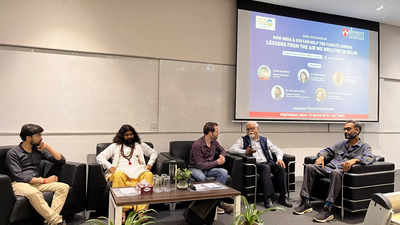Fighting pollution need of the hour: Expert panel

Panel discussion on “How India and G20 Can Help the Climate Agenda: Lessons from the Air We Breathe in Delhi”.
By Ritika Choudhary
Times School of Media on 24th February held a panel discussion on “How India and G20 Can Help the Climate Agenda: Lessons from the Air We Breathe in Delhi” at Bennett University.
The panel consistedDr Ravi Kant Pathak , Associate Professor at the University of Gothenburg, Sweden. Dr. EpameiNondas Tsiligiannis , research engineer at the University of Gothenburg. Mr. Harsh Raj Mishra resident researcher at the Indo Gangetic Plains – Centre of Air Research and Education (IGP-CARE); and Mr. Prateek Kumar, an environmentalist and advocacy consultant.
The session covered issues like how With the Average AQI in Delhi being 250+ breathing in Delhi is equivalent to smoking 33 cigs a day and how 16.7 lakh people died due to air pollution in India in 2019, according to a report published in The Lancet Planetary Health journal, making it the need of the hour to fight pollution.
Currently, India’s G20 presidency with the theme of “One Earth, One Family, One Future”, is the best hope for the world in its fight against the climate crisis afterPM Narendra Modi listed climate crisis along with terror and the pandemic, as being the most significant challenges the world needs to fight together.
Dr Ravi Kant Pathak explained, “everything that goes into the atmosphere undergoes complex chemistry and physical state of the material that is floating in the air is evolving and transforming continuously and is also evolving from the molecular perspective while taking a toll on people’s health and Earth’s climate.”
“Air quality and climate are two sides of the same coin,” said Dr Nondas. So, if you want to solve one of these you have to think a little more complex regarding both issues.
He advised measures like influencing public opinion by becoming a journalist, influence stakeholders, politicians, communicate scientific knowledge or findings in an attractive way to prevent this potential catastrophe.
“In the IGP area pollution starts from Pakistan and goes all the way down to Bangladesh defying any borders and if we want to fight it, we need a unique collaboration,” Dr Nondas added. One of the major weapons one can use against climate change is sustainable development which is mainly nature or environment centric development.
The students after attending today's session also expressed how they do not feel as helpless anymore about not helping the environment.
“Big changes need time and my little contribution can help a lot and I'll keep doing them with the amount of information and ideas I acquired from this session,” said Aarushi Bhadury, a 4th semester BAJMC student.
It also acted as an eye opener for students as it made them realise the importance of air and how “this is an alarming situation for which we need to improve our day-to-day activities to maintain the environment as well as our health,” said Sharva Shrivastava, a 4th semester BAJMC student.
(The writer is a Semester IV student of BA (Journalism and Mass Communication) programme.)
Times School of Media on 24th February held a panel discussion on “How India and G20 Can Help the Climate Agenda: Lessons from the Air We Breathe in Delhi” at Bennett University.
The panel consisted
The session covered issues like how With the Average AQI in Delhi being 250+ breathing in Delhi is equivalent to smoking 33 cigs a day and how 16.7 lakh people died due to air pollution in India in 2019, according to a report published in The Lancet Planetary Health journal, making it the need of the hour to fight pollution.
Currently, India’s G20 presidency with the theme of “One Earth, One Family, One Future”, is the best hope for the world in its fight against the climate crisis after
Dr Ravi Kant Pathak explained, “everything that goes into the atmosphere undergoes complex chemistry and physical state of the material that is floating in the air is evolving and transforming continuously and is also evolving from the molecular perspective while taking a toll on people’s health and Earth’s climate.”
“Air quality and climate are two sides of the same coin,” said Dr Nondas. So, if you want to solve one of these you have to think a little more complex regarding both issues.
He advised measures like influencing public opinion by becoming a journalist, influence stakeholders, politicians, communicate scientific knowledge or findings in an attractive way to prevent this potential catastrophe.
“In the IGP area pollution starts from Pakistan and goes all the way down to Bangladesh defying any borders and if we want to fight it, we need a unique collaboration,” Dr Nondas added. One of the major weapons one can use against climate change is sustainable development which is mainly nature or environment centric development.
The students after attending today's session also expressed how they do not feel as helpless anymore about not helping the environment.
“Big changes need time and my little contribution can help a lot and I'll keep doing them with the amount of information and ideas I acquired from this session,” said Aarushi Bhadury, a 4th semester BAJMC student.
It also acted as an eye opener for students as it made them realise the importance of air and how “this is an alarming situation for which we need to improve our day-to-day activities to maintain the environment as well as our health,” said Sharva Shrivastava, a 4th semester BAJMC student.
(The writer is a Semester IV student of BA (Journalism and Mass Communication) programme.)










Recent Messages ()
Please rate before posting your Review
SIGN IN WITH
Refrain from posting comments that are obscene, defamatory or inflammatory, and do not indulge in personal attacks, name calling or inciting hatred against any community. Help us delete comments that do not follow these guidelines by marking them offensive. Let's work together to keep the conversation civil.